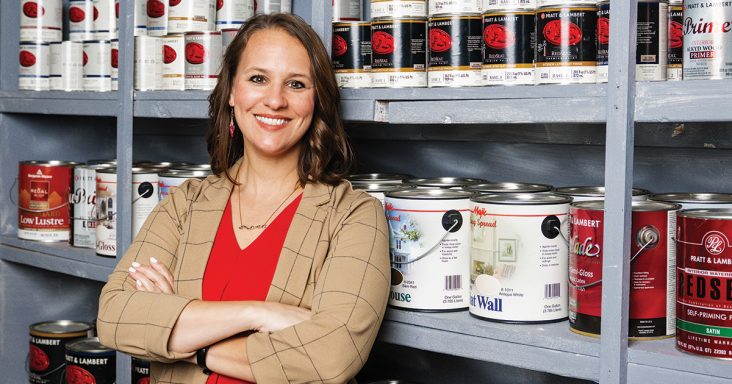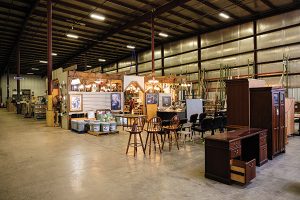Habitat for Humanity CEO Ashley Wheeler looks to scale home projects
by April 10, 2025 3:53 pm 1,255 views

Ashley Wheeler, CEO of Habitat for Humanity of Northwest Arkansas
Ashley Wheeler, CEO of Habitat for Humanity of Northwest Arkansas, became personally involved in the organization as a Fayetteville teen. She put in sweat equity hours for her new Habitat for Humanity home, which she and her family moved into when she was 16.
Almost two decades later she joined the board of Habitat for Humanity of Washington County and helped it merge with the Benton County affiliate to become Habitat for Humanity of Northwest Arkansas. The merger was completed July 1. A grant from the Walton Family Foundation supported the merger, which was in the works for about two years. The grant also supports marketing and the ongoing work to consolidate the affiliates’ offices into one.
The nonprofit builds affordable homes for families in Northwest Arkansas with the help of volunteers and donors. Eligible families earn 50% to 80% of area median income and are selected after a qualification process, including an application and credit check. While there’s no credit score requirement, approved families must complete 300 to 400 hours of sweat equity by the closing date.
“The misconception that most people have is that Habitat gives away houses,” Wheeler said. “We don’t give away houses. We provide an affordable mortgage with zero downpayment, and we set that mortgage amount to 30% of the homeowner’s income. What’s unique about us is we consider their current debt in that 30%.”
Wheeler started as CEO in late October after serving on the board for over three years.

“I felt like it was my calling,” she said. “I grew up in a Habitat house here in Fayetteville.”
She’s spent the first several months in the new role “observing as much as I could … I kept saying, ‘I’m analyzing how big the fires are, whether they’re bonfires or … fireplace fires.’ I had to take care of some bonfires even before … four months were up.”
Before the merger, she said the separate affiliates had unique internal cultures and were restricted to their respective counties for development and fundraising. A motive for merging was the lack of awareness that they were separate organizations.
“Now we can reach across the county lines, and we can fundraise on a much greater scale because the folks that want to have a huge impact and donate money or time … want to have a more significant impact than just what either affiliate could do individually. And we’re going to be able to facilitate that now. We’re going to be able to build at a much greater scale.”
Wheeler said her goal is to build 20 homes annually. The nonprofit has three or four under construction and aims to build eight this year. She said the organization will need to partner with others to reach the goal, and she plans to do so. The organization needs donations, volunteers and people to shop at its Restore retail stores in Fayetteville and Bentonville.
HABITAT HOUSE
Growing up, she said she moved frequently and lacked stability in her home life. She moved 20 times and changed schools nine times before moving into the Habitat house.
“For the first time in my life as a 16-year-old, I was proud of where I lived,” she said. “I was proud to have friends over, and it really impacted me in that way. That stability … that when you are a kid you don’t really understand …
“Looking back, I watched my mom work really hard to become a partner family. She had to do a lot of work to get her credit in order, pay off debt and we got to work together to do the sweat equity hours. All of that just built something in me that triggered a desire to be a homeowner, a desire to work hard and that huge understanding that you have to work hard for what you want. The whole Habitat experience from the eyes of a 15, 16-year-old … changed the trajectory of my life.”
She said the sweat equity hours are earned by helping to build the homes for the families “that are ahead of you in line. We had a few hours left by the time it was time to build our house. I had just turned 16 whenever it was time to build my house, and I got to jump on the job site.”
Those who work on the job site must be at least 16, “and I got to be part of raising the first wall,” she said. Her mother previously earned sweat equity hours working on the neighbor’s house.
BANKING CAREER
Before becoming CEO, Wheeler worked in banking for 10 years. She was a community loan officer at First National Bank of Northwest Arkansas for more than four years, helping people with mortgages and doing consumer lending.
She said helping people purchase their first homes “was extremely fulfilling.” She was proud of the many young applicants for whom she helped build plans to buy a house over six months to a year. “That was extremely rewarding, and I didn’t even know it would play into a future career.”
The role helped her develop an affordable housing background. She said she became familiar with Fannie Mae and Freddie Mac, and the experience helped her in her existing role. This includes understanding income guidelines, requirements, investors and overlays.
“We’re really shooting for the same clientele — Habitat for Humanity and those loan products,” she said. “I was already working with the families that could potentially be Habitat homeowners as well.”
She started in banking at First Security Bank as a teller after a career change from small business owner. Within a year, she was promoted to loan assistant and served in that position for about four years before becoming branch manager and working in business development at the Pinnacle Hills branch in Rogers.
“I knew I wanted to be a lender,” she said. “I asked Adam Rutledge … about the best way to move forward in the company, and I didn’t have a college education. I asked Adam, ‘Do I need to just go get my degree? Is that what’s going to help me become a loan officer?’”
She said he recommended that she take banking classes to help her become a lender. She took online classes at NorthWest Arkansas Community College, such as accounting, to prepare her to be a better banker. With a referral, she followed a friend to join First National Bank of Northwest Arkansas in Rogers. She started as a loan assistant before becoming a lender after about six months.
NONPROFIT MOVE
She said the banking and nonprofit sectors share similarities, such as their community involvement. Before, the goal was to grow loans and deposits. Now, it’s to grow awareness and home donations.
Her new role is different because she has a larger staff, “but it’s so fun. I’m enjoying every minute of it — getting to develop partnerships with the community … The reason why you’re developing the relationships here at Habitat is so much more significant to me personally.”

Habitat for Humanity of Northwest Arkansas has 17 board members and 25 employees, including office staff and workers at its Restore locations in Fayetteville and Bentonville, which are 20,000 square feet and 8,000 square feet, respectively. Existing office staff work at the Restore locations; however, the plan is to combine the staff into one office in Lowell.
Tyler Steele, vice chairman of Grand Savings Bank, is board president of Habitat for Humanity of Northwest Arkansas. He joined the board for the Benton County affiliate in 2021 and became president in 2024. Steele met Wheeler while serving on the board and discussing merging the two affiliates.
He said the affiliates had the same mission but carried it out slightly differently. Wheeler brought the experience of the Washington County affiliate and learned how the Benton County affiliate operated. She helped place people in roles aligned with their strengths and moved them from duplicate roles.
“For her, there was no true job description,” Steele said. “There was no playbook … Nobody had ever done this job before … July 1 we became the new organization, but Ashley didn’t start until the end of October.”
He said many organizations provide affordable housing to rent, but few help those who are unlikely to receive a normal bank loan buy a house at 0% interest.
“We now got that ball rolling. That little snowball is becoming bigger…and the exciting part is the partnerships that Ashley has been able to already kind of form and is working on,” he said. “Instead of us talking about one house here, one house there, we’re talking about subdivisions. We’re talking about townhomes that a homeowner could own each individual townhome. That’s a nine-unit project… People are coming to us now because she’s gotten out there and spreading the mission of what Habitat is and making people aware.”
